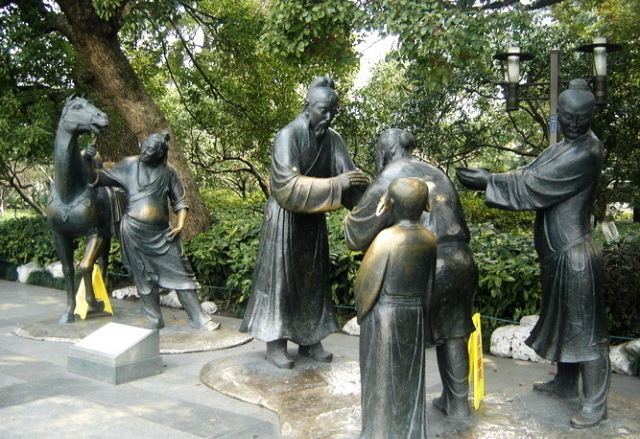

Hangzhou has been governed by two mayors who were also lauded as poets: Bai Juyi and Su Dongpo.
The renowned poet Bai Juyi travelled to Hangzhou to assume his post as mayor in the early ninth century. Determined to improve the city’s water supply and prevent flooding, Mayor Bai embarked on a plan to dredge West Lake and construct a causeway that divided the lake in two. This allowed the lake to be used to store water in good years and irrigate the fields in times of drought. This feat of engineering marked an epoch in the evolution of West Lake. Nurtured over time from a natural lake to the carefully crafted wonder that exists today, the general layout and features of West Lake took shape during Bai Juyi’s tenure.
Mayor Bai was enamored with nature. Where there was water he planted lotuses, and where there were hills he planted pines. Over time, clusters of peach blossoms and willows appeared along the causeway to delight visitors to West Lake. Spring was an especially beautiful time as puffs of mist wafted over the lake, willow branches skimmed the causeway, and bunches of colorful flowers decorated the landscape. During his lifetime, Mayor Bai composed more than 3,600 poems, 200 of which described the landscape of West Lake. He wrote more poems extolling the lake than any other person did in the history of literature.
In the late 11th century, West Lake welcomed another great poet as mayor – Su Dongpo.
Mayor Su was creative in his approach to exerting control over West Lake. He used the vast amount of silt that had been dredged from the lake to create a causeway that spanned it from north to south. He built six small bridges and nine pavilions along the causeway. Mayor Su reduced silt build-up by erecting three small towers in the middle of the lake, and then stipulating that no aquatic plants be cultivated within the area enclosed by the towers. This area was eventually developed into the scenic view of Three Pools Mirroring the Moon.
]Mayor Su delighted in boating around West Lake. He observed changes in the weather and seasons, and then cleverly transformed them into elegant verse. His poem “Drinking at the Lake; It Was Clear at First but Later It Rained” is still considered the most vivid description of the lake. He wrote: The gleam of this bright expanse of water, fine while the weather’s clear; The color of the hills under a drizzly sky – rain too is superb! Shall I compare West Lake to the lovely His-tzu, in light make-up or heavy, equally fine? With poets’ appreciation for beauty, Bai Juyi and Su Dongpo transformed the water conservancy projects of West Lake into a Chinese landscape painting. Their exploration of the lake’s aesthetic qualities has had far-reaching effects. Over the years as new generations assumed the mantle of innovator, West Lake solidified its status as the benchmark for classical lakes in Eastern cultures.
West Lake was fortunate to have been governed by two eminent poets such as Bai Juyi and Su Dongpo. The people of Hangzhou commemorated these exceptional mayors by naming the two causeways that they built after them. During their administrations, Bai Causeway and Su Causeway provided a link between urban life and natural beauty. More than a thousand years later, this link still exists in the allure of West Lake.